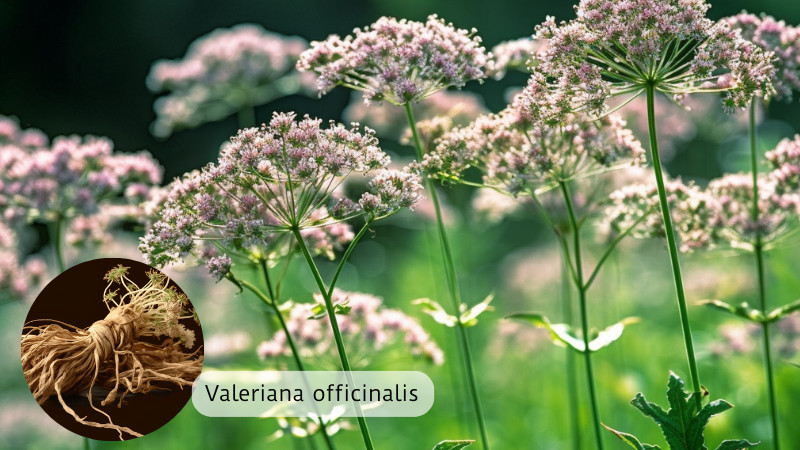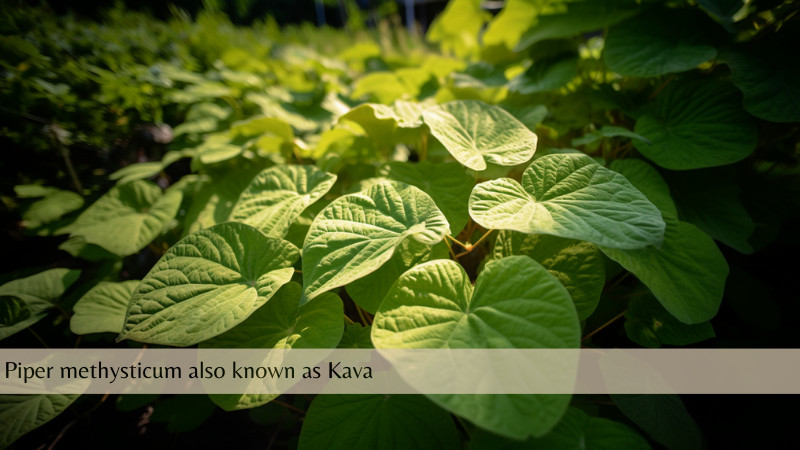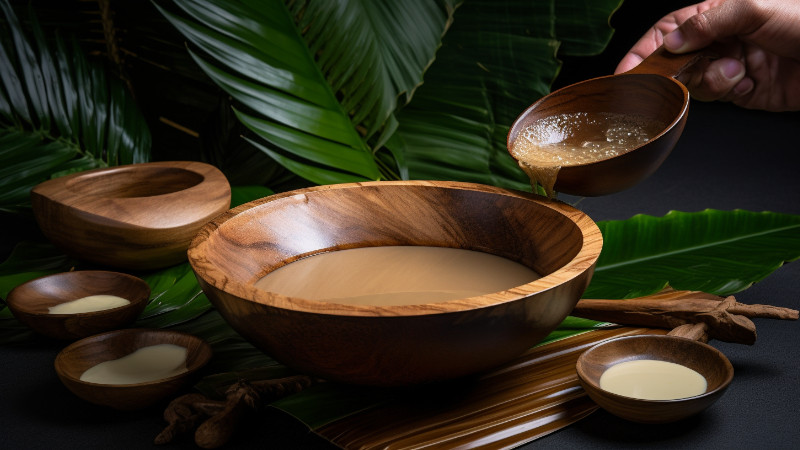With the rising popularity of natural remedies like Valerian Root and Kava, it’s crucial to understand their benefits and potential risks. Amidst the buzz, one alarming question emerges: Can Kava kill you? Let’s dive deep into the world of these herbal wonders.
In this article, we’ll take a close look at both Valerian Root and Kava. We’ll explore their benefits, how they work, and any risks involved.
By the end, you’ll have a better idea of what each one offers and whether they’re right for you. So, keep reading, and sip your HerbiTea if you’ve ever been curious or had concerns about these two.
Table of Contents
What is Valerian Root?
Valerian, also known as Valeriana officinalis is a plant native to Europe and Asia, but it is also found in North America. It is primarily known for the root, which has been used for medicinal purposes for centuries. Historically, valerian root has been utilised for various ailments, including sleep disorders, anxiety, and gastrointestinal pain.
In modern times, it is commonly used as a dietary supplement to aid sleep.

The exact mechanism of how valerian works is not fully understood, but it is believed to increase the levels of a chemical called gamma-aminobutyric acid (GABA) in the brain. GABA regulates nerve impulses, and higher levels can have a calming effect, which might explain valerian’s potential sedative properties.
Intrigued? We’ve detailed its properties in our article what’s valerian root good for? Dive into this piece to explore its historical uses and supporting scientific research.
Whether you’re considering it for wellness or just curious, our article offers a comprehensive overview. Don’t miss out on this informative read!
What is Kava?
Kava, also known as Kava Kava, is derived from the roots of the Piper methysticum plant, which belongs to the pepper family.
This plant is native to the Western and South Pacific regions and is common in places like Polynesia and Micronesia.
Kava is also known locally as “Kawa kawa”, “Ava” in Samoa, “Awa” in Hawaii, “Malak” in Vanuatu, “Sako” in Pohnpei, and “Yaqano” in Fiji. 1 2
And curiously, in Germany, it is called “Rauschpfeffer”. Not where I expected Kava to show up in my research, but, there you have it.

Kava has been used for centuries as both a recreational and ceremonial drink. The preparation involves grinding the roots into a fine pulp and adding water.
The term “Kava” is derived from the Polynesian word “awa,” signifying “bitter.” So, its taste is known to be bitter. The active compounds in Kava, known as kavapyrones or kavalactones, give it its characteristic effects when consumed. 3
Kava Side Effects
Kava, a traditional drink with roots in the Pacific Islands, no pun intended, has been consumed for centuries for its unique effects on the body and mind.
But what exactly happens when you consume this earthy beverage?
| Immediate Effects | Relaxation – Kava can induce feelings of happiness and relaxation. Mild Sleepiness – Some individuals may feel drowsy. 4 Numbness – Kava also possesses local anesthetic qualities, benzoic and cinnamic acid residues, leading to a distinct numbing feeling when kept in the mouth. 5 6 Reduced Appetite – Kava can lead to a decreased desire to eat. 7 |
| Excessive Consumption Effects | Drowsiness – Taking too much Kava, might lead to drowsiness because it releases stress and anxiety in your body. Nausea – Overconsumption can cause an upset stomach. 8 Loss of Muscle Control – Kava users may experience difficulty in movement. 9 Mild fever, pupil dilation, and red eyes – Users may experience physical symptoms when too much consumption of Kava. 10 |
| Long-Term Effects | Mood Swings – Regular and excessive consumption of Kava over extended periods can lead to mood swings. Dry and scaly skin – Kava can cause a scaly skin condition that is understood to be reversible. 11 Malnutrition – Reports show malnutrition is more common among kava drinkers in some areas, presumably as a result of Kava addiction rather than proper dietary consumption. 12 Increased susceptibility to infections – It has been shown that necrotic hepatitis and cholestatic hepatitis have been caused by Kava overdose. 13 Shortness of breath – Kava users in Aboriginal communities were observed to have exhibited various health issues, including signs suggestive of pulmonary hypertension, which was linked to complaints of shortness of breath. 14 |
Kava Benefits

Kava, a traditional beverage, has been cherished by Pacific Islanders for centuries. Its unique properties have not only made it a staple in cultural ceremonies but have also garnered attention from the global community. Some of the notable benefits of Kava include:
- Anxiety Relief
- Kava is renowned for its calming effects, making it a natural remedy for anxiety. Its ability to promote relaxation without causing drowsiness has made it a sought-after alternative to conventional medications. 15
- Anti-inflammatory Properties
- Kava possesses properties that counteract inflammation, potentially aiding in the management of conditions where inflammation is a factor. There’s a belief that tweaking the compounds in Kava could enhance its anti-inflammatory benefits. 16
- Yet, the full scope of its effects remains under investigation. Some studies even indicate that Kava might, in certain situations, trigger an inflammatory reaction. 17
- Anticancer Potential
- Kava contains compounds like flavokavain A and B that demonstrate anti-cancer effects by inhibiting cancer cell growth and promoting programmed cell death. Research indicates potential in using Kava components for cancer prevention and treatment, especially in epithelial cancers. 18
- Neurological Benefits
- Kava has been shown to have positive effects on the nervous system. Its neuroprotective properties can be beneficial in conditions related to brain health. 19
- Recreational Use
- Beyond its therapeutic benefits, Kava has gained popularity in Western countries as a recreational drink, offering a unique experience of relaxation and mild euphoria. 20
Kava is not just a cultural treasure of the Pacific Islands but also a natural substance with a number of health benefits, when used appropriately. It was not considered a supplement in the traditional form when consumed as a drink and has been regulated in certain parts of the world quite strictly. 21
Can Kava Kill You?
While reading about the side effects of Kava above, you might be wondering, “Can Kava actually kill you?” It’s a valid concern, especially when considering any supplement or herbal remedy.
While Kava has been linked to serious health issues like liver damage, fatalities are extremely rare and often involve factors like excessive consumption, pre-existing health conditions, or interaction with certain medications.
Reports have linked Kava consumption to serious liver injuries, including cases severe enough to require liver transplantation and, in rare instances, leading to death. 22
The liver injuries reported range from moderate enzyme elevations to acute liver failure. The severity can vary, but in most cases, stopping from consuming Kava leads to recovery.
Kava may cause liver damage due to its metabolisation by liver enzymes, its potential to accumulate drugs, its metabolisation into harmful substances, its association with alcohol, or inflammation and depletion of vital liver substances. 23
So can Kava kill you? Even though Kava-related deaths are very rare, they are not completely impossible, especially when the drug is used irresponsibly.
Remember, if you’re thinking about trying Kava, it’s important to consume it responsibly, be aware of any potential liver effects, and always get medical advice, especially if you already have health issues or are taking other medications.
How does Kava work in the Brain and Body?
Kavalactones are the primary active compounds found in the kava plant. They have a profound impact on the brain, leading to the calming and anxiolytic effects that kava is known for. Here’s how kavalactones work in the brain:
- GABA Receptor Modulation
- Similar to Valerian, although not precisely the same, kavalactones have also been shown to interact with the GABA (gamma-aminobutyric acid) receptors in the brain. 24
- Inhibition of Noradrenaline Uptake
- Some studies suggest that kavalactones can inhibit the reuptake of noradrenaline, another neurotransmitter. By doing so, they can increase the levels of noradrenaline in the brain, which can have anxiolytic (anti-anxiety) effects. 25
- Modulation of Dopamine Levels:
- Kavalactones may also influence dopamine levels in the brain. Dopamine is a neurotransmitter associated with pleasure, reward, and motivation. By modulating dopamine levels, kavalactones can influence mood and feelings of well-being. 26
- Ion Channel Modulation
- Kavalactones have been shown to modulate ion channels in the brain, particularly sodium and calcium channels. This can influence the excitability of neurons and contribute to the sedative effects of kava. 27
It’s important to note that while Kava has been used traditionally for a long time, and in some modern applications it has been used for its calming effects, it’s essential to consult with healthcare professionals before using it, especially if you are on any medication or have specific health conditions.
Kava and Alcohol Drug Interactions Dosage
When Kava and alcohol are consumed together, their combined effects can lead to heightened impairment and intoxication. H. Foo., et al. found that the combination produced even larger negative changes in subjective measures than when either substance was taken individually. 28

Additionally, both substances are metabolised in the liver, and there have been concerns about Kava’s potential to cause liver damage. While the exact cause of this liver damage remains uncertain, combining Kava with alcohol could amplify the risk.
Given these findings, it’s advised to avoid consuming alcohol while taking Kava due to the increased risks of intoxication, cognitive impairment, and potential liver complications.
Are Kava supplements safe?
Kava supplements have raised concerns regarding their safety, especially concerning liver health.
According to the information from the National Institutes of Health, the U.S. Food and Drug Administration (FDA) issued warnings about the potential risk of severe liver injury associated with the use of kava-containing dietary supplements on March 25, 2002.
The FDA’s advisory was based on reports of liver-related injuries, including hepatitis, cirrhosis, liver failure, and even death. 29
Similarly, a case report from the CDC highlighted cases of hepatic toxicity possibly associated with kava-containing products.
Given these concerns and reports, while Kava has traditional uses and potential benefits, its supplements, especially when consumed in large amounts or for extended periods, may pose risks to liver health. 30
Kava Safety Tips
To be clear, none of this is advice in any medical sense, these are tips to think about when exploring the topic of Kava, and if you are already using it. It’s essential to be informed and cautious to ensure safety with products like this. Here are some considerations and cautions when using Kava:
- Tip 1: Dosage Considerations
- It’s crucial to follow recommended dosages when consuming Kava. Overconsumption and misuse can lead to adverse effects such as liver toxicity. 31
- Tip 2: Potential Interactions
- Kava can interact with certain medications, including antipsychotic drugs, including Levodopa (used for Parkinson’s disease), and other medications that are metabolised by the liver. 32
- Tip 3: Limit Alcohol Consumption
- Combining kava with alcohol can intensify the effects of both substances, increasing the risk of liver damage and other adverse reactions like impairment intoxication and cognitive performance.
- Tip 4: Be Aware of Side Effects
- Some common side effects of kava include dizziness, headache, drowsiness, and gastrointestinal upset. If you experience any unusual or severe side effects, it’s essential to stop using kava and consult a healthcare professional. 33
- Tip 5: Pregnancy and Breastfeeding
- Kava kava is not recommended during pregnancy and breastfeeding due to concerns about its effects on liver health and the potential risks it might pose to the central nervous system of the developing fetus. 34
- Tip 6: Liver Health
- The article from the Medical Journal of Australia “Kava: herbal panacea or liver poison?” highlights concerns about kava’s potential liver toxicity. Factors contributing to this hepatotoxicity include specific extraction procedures, genetic differences in liver metabolism, and co-ingestion of other agents. The exact mechanisms remain under investigation, emphasising the need for further research on kava’s safety. 35
- Tip 7: Purchase from Reputable Sources
- Ensure that you’re buying kava from reputable sources to avoid products that might be adulterated or of low quality.
Which is better Kava or Valerian Root?
Both kava and valerian individually provided significant relief from stress-induced insomnia. As there is no significant difference in their efficacy when used individually, neither kava nor valerian root can be definitively stated as being “better” than the other. 36
Valerian root is a natural alternative often considered safer than Kava, especially in terms of liver health.
While both are natural remedies for anxiety and sleep disorders, valerian root hasn’t been linked to the severe liver damage cases associated with Kava.
For those seeking a natural option with fewer potential risks, valerian root is a more suitable choice. You can read more on its comprehensive guide to valerian root and how it may benefit your health.
Which is stronger Valerian or Kava?
Kava is generally considered stronger than valerian root in terms of its psychoactive effects. While both herbs are used for anxiety and sleep disorders, Kava has a more pronounced sedative effect and can induce a feeling of euphoria in some users.
On the other hand, valerian root tends to have milder effects, primarily promoting relaxation and sleep. However, the strength and effectiveness of each can vary based on individual reactions and the specific preparation or dosage used.
FAQs
Can I take Kava for anxiety?
Yes, Kava has been traditionally used to alleviate anxiety due to its calming effects. Caution needs to be exercised with this, and it is a good idea to seek professional advice first.
What organ does Kava damage?
Kava can damage the liver due to certain chemically active compounds it contains, which may lead to liver toxicity and stress. Prolonged or excessive consumption of Kava has been linked to cases of liver failure and hepatitis.
Is it safe to drink Kava every day?
Drinking Kava every day may pose risks to liver health. Some studies and case reports have linked daily Kava consumption to liver damage and even liver failure.
While occasional use might be considered safe for some people, daily consumption is not generally recommended.
What happens if you use too much Kava?
Excessive consumption of Kava can lead to various adverse effects including liver damage, skin changes like scaly rashes, fatigue, and impaired motor reflexes. Over time, heavy Kava use can also result in shortness of breath, weight loss, facial puffiness, and more.
Can I take Kava and Valerian together?
While both Kava and valerian roots are used for relaxation and sleep promotion, combining them may amplify their sedative effects. It’s best to consult a healthcare professional before taking them together to ensure safety and avoid potential interactions with other medications you may be on.
Is Kava safe in moderation?
Kava, when consumed in moderation, has been traditionally used in Pacific Island cultures without apparent harm for generations. However, there have been reports of liver damage associated with Kava supplements, especially when taken in large amounts or for extended periods.
Does Kava give you a hangover?
No, Kava does not typically give you a traditional alcohol-like hangover. However, excessive consumption or use of potent kava preparations can lead to a feeling of grogginess or lack of energy the next day.
Conclusion
In delving into the issue of “Can Kava Kill You?”, it is clear that although Kava has been a traditional and ceremonial beverage in the Pacific Islands for centuries, study on its effects and potential hazards is still ongoing.
While moderate consumption might offer relaxation and cultural connection, excessive or prolonged use can have adverse effects on the liver and other aspects of health. As with any substance, it’s crucial to approach kava with knowledge and caution.
We invite you to join the “Can Kava kill you?” conversation with us on Instagram and Pinterest, where we delve deeper into such topics and value the insights and experiences of our community. Join us there and let’s navigate the world of kava together!
References
- “Kava – Uses, Side Effects, and More” – WebMD Staff, Last checked 25 October 2023 [WebMD] [Archive] ↩︎
- “The Health Benefits of Kava: May Reduce Anxiety and Improve Sleep in People With Insomnia” – C. Wong, 22 September 2022 [Verywell Mind] [Archive] ↩︎
- “Kava kava” – Mount Sinai Staff, Last checked 25 October 2023 [Mount Sinai] [Archive] ↩︎
- “Kava” – ADF Staff, 14 June 2023 [Alcohol and Drug Foundation] [Archive] ↩︎
- “Kava” – NYU Langone Health Staff, 25 October 2023 [NYU Langone Health] [Archive] ↩︎
- “Pharmacology of Kava and its Constituents.” – M. Blumenthal, Y. Singh, Last checked 25 October 2023 [American Botanical Council] [Archive] ↩︎
- “Toxicity of Kava Kava” – P. Fu, Q. Xia, L. Guo, H. Yu, P. Chan, 26 March 2018 [PubMed Central] [Archive] ↩︎
- “An Updated Review on the Psychoactive, Toxic and Anticancer Properties of Kava” – R. Soares, R. Oliveira, N. Oliveira, 12 July 2022 [PubMed Central] [Archive] ↩︎
- “Development of tolerance to kava in mice” – P. Duffield, D. Jamieson, Last checked 25 October 2023 [PubMed] [Archive] ↩︎
- “Assessment of the risk of hepatotoxicity with kava products” – WHO Staff, 25 October 2023 [World Health Organization] [Archive] ↩︎
- “Kava dermopathy” – G. Harvey, A. Oakley, Last checked 25 October 2023 [DermNet] [Archive] ↩︎
- “Kava: A Human Health Risk Assessment ” – FSANZ Staff, Last checked 25 October 2023 [Food Standards Australia New Zealand] [Archive] ↩︎
- “Toxicity of Kava Kava” – P. Fu, Q. Xia, L. Guo, H. Yu, P. Chan, 26 March 2018 [PubMed Central] [Archive] ↩︎
- “Effects of the heavy usage of kava on physical health: summary of a pilot survey in an aboriginal community” – J. Matthews, M. Riley, L. Fejo, E. Munoz, N. Milns, I. Gardner, J. Powers, E. Ganygulpa, 6 June 1988 [PubMed] [Archive] ↩︎
- “Kavain, the Major Constituent of the Anxiolytic Kava Extract, Potentiates GABAA Receptors: Functional Characteristics and Molecular Mechanism” – H. Chua, E. Christensen, K. Jensen, L. Hartiadi, I. Ramzan, A. Jensen, N. Absalom, M. Chebib, 22 June 2016 [PLOS] [Archive] ↩︎
- “Identification of a Kavain Analog with Efficient Anti-inflammatory Effects” – O. Huck, X. Han, H. Mulhall, I. Gumenchuk, B. Cai, J. Panek, R. Iyer, S. Amar, 10 September 2019 [Springer Nature] [Archive] ↩︎
- “Pacific Island ‘Awa (Kava) Extracts, but not Isolated Kavalactones, Promote Proinflammatory Responses in Model Mast Cells” – L. Shimoda, C. Park, A. Stokes, H. Gomes, H. Turner, 4 April 2012 [John Wiley & Son] [Archive] ↩︎
- “The protective effects of Kava (Piper Methysticum) constituents in cancers: A systematic review” – A. Celentano, A. Tran, C. Testa, K. Thayanantha, W. Orders, S. Tan, M. Syamal, M. McCullough, T. Yap, 8 July 2019 [PubMed Central] [Archive] ↩︎
- “Kava as a Clinical Nutrient: Promises and Challenges” – T. Bian, P. Corral, Y. Wang, J. Botello, R. Kingston, T. Daniels, R. Salloum, E. Johnston, Z. Huo, J. Lu, A. Liu, C. Xing, 5 October 2020 [PubMed Central] [Archive] ↩︎
- “Kava” – Healthdirect Australia Staff, Last checked 26 October 2023 [Healthdirect Australia] [Archive] ↩︎
- “New kava regulations in Australia” – ADF Staff, 27 April 2022 [Alcohol and Drug Foundation] [Archive] ↩︎
- “LiverTox: Clinical and Research Information on Drug-Induced Liver Injury (Kava-Kava)” – Author, 10 April 2018 [National Library of Medicine] [Archive] ↩︎
- “Kava Kava: Calming but Potentially Toxic” – P. Soto, Last checked 26 October 2023 [National Capital Poison Center] [Archive] ↩︎
- “Kavapyrone enriched extract from Piper methysticum as modulator of the GABA binding site in different regions of rat brain” – A. Jussofie, A. Schmiz, C. Hiemke, Last checked 26 October 2023 [PubMed] [Archive] ↩︎
- “Kava and its Kavalactones Inhibit Norepinephrine-induced Intracellular Calcium Influx in Lung Cancer Cells” – J. Botello, P. Corral, T. Bian, C. Xing, 11 November 2019 [PubMed] [Archive] ↩︎
- “Effect of kava extract and individual kavapyrones on neurotransmitter levels in the nucleus accumbens of rats” – S. Baum, R. Hill, H. Rommelspacher, 28 January 1999 [Science Direct] [Archive] ↩︎
- “Kava pyrones exert effects on neuronal transmission and transmembraneous cation currents similar to established mood stabilizers – a review” – H. Grunze, J. Langosch, K. Schirrmacher, D. Bingmann, J. Wegerer, J. Walden, 2 November 2001 [Science Direct] [Archive] ↩︎
- “Acute effects of kava, alone or in combination with alcohol, on subjective measures of impairment and intoxication and on cognitive performance” – H. Foo, J. Lemon, Last checked 26 October 2023 [PubMed] [Archive] ↩︎
- “FDA Issues Consumer Advisory for Dietary Supplements Containing Kava” – NIH Staff, 25 March 2002 [National Institutes of Health] [Archive] ↩︎
- “Hepatic Toxicity Possibly Associated with Kava-Containing Products — United States, Germany, and Switzerland, 1999–2002” – CDC Editorial Staff, 29 November 2002 [CDC] [Archive] ↩︎
- “Kava safety questioned due to case reports of liver toxicity” – M. Blumenthal, Last checked 26 October 2023 [American Botanical Council] [Archive] ↩︎
- “Life-threatening parkinsonism induced by kava-kava” – E. Meseguer R. Taboada, V. Sanchez, M. Mena, V. Campos, J. Yebenes, Last checked 26 October 2023 [PubMed] [Archive] ↩︎
- “kava (piper methysticum) – oral” – MedicineNet Staff, Last checked 26 October 2023 [MedicineNet] [Archive] ↩︎
- “Kava Kava” – M. Hardy, S. Mills, 4 December 2009 [Science Direct] [Archive] ↩︎
- “Kava: herbal panacea or liver poison?” – R. Moulds, J. Malani, 5 May 2003 [Medical Journal of Australia] [Archive] ↩︎
- “Stress-induced insomnia treated with kava and valerian: singly and in combination” – D. Wheatley, Last checked 26 October 2023 [PubMed] [Archive] ↩︎
Last Updated on 5 months by D&C Editorial Team


